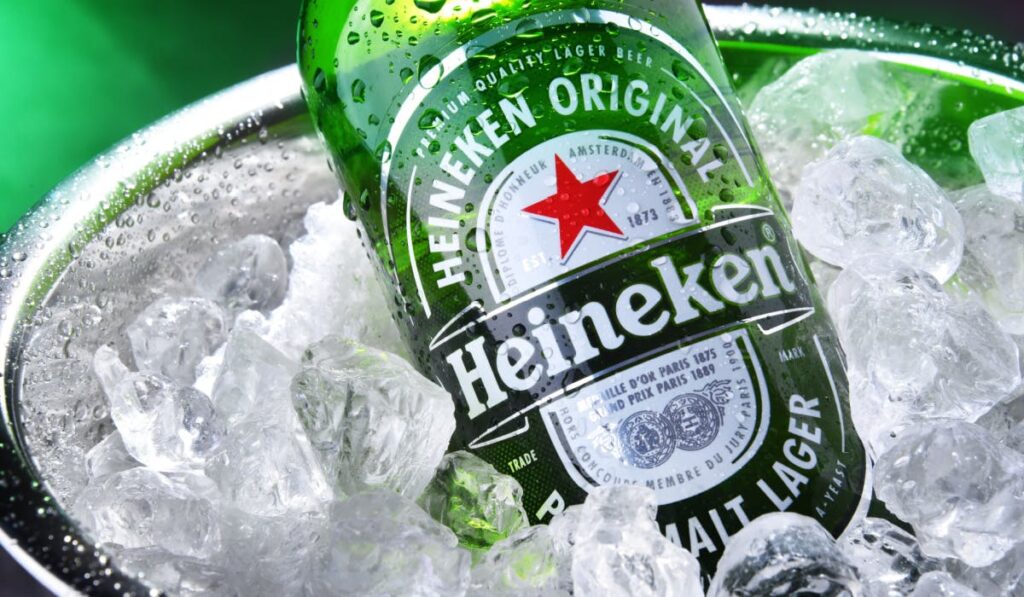
Heineken increased its marketing investment by €300m (£250.4m) in 2024, representing a 10.7% increase from the year before, as it pursued “balanced” volume and value growth.
“In every one of our regions, our investments in marketing was ahead of revenue growth,” said Heineken CEO Dolf van den Brink on a call to investors today (12 February), noting that marketing accounts for 9.8% of revenue.
The increased spend ensured “balanced and consistent support” throughout the year, driving category growth across its brands. Heineken concentrated its investment in key high-growth markets, including Brazil, Mexico, South Africa, Nigeria, Vietnam and India.
Alongside its marketing push, Heineken delivered “good, balanced” growth in both volume and value.
“Our ambition is to deliver superior, balanced growth to consistently create long-term value,” explained van den Brink. “And this year, that certainly has delivered […] We delivered balanced growth between volume and value.”
The company achieved beer volume growth of 1.6% for the full year ending 31 December 2024, with its beer volume expanding in all four regions – Africa and Middle East, Americas, Asia Pacific and Europe – across both developed and emerging markets.
“The delivery of our growth has been balanced, and moreover, the value growth itself has been of high quality,” van den Brink said, highlighting an 8.3% rise in operating profit to €3.5bn (£2.92bn).
Premium beer sales grew 5%, led globally by Heineken, which was up 9%. Mainstream beer volume rose 2%, led by top brands in key markets, including Amstel in Brazil, Cruzcampo in the UK and Kingfisher in India. The beyond beer segment grew 4%, led by Desperados globally and Savanna cider in Southern Africa.
Heineken 0.0 grew 10% in a category that delivers “growth, profitability and moderation”, according to van den Brink.
“I’m also especially proud that the Heineken brand continues to be admired for its creativity in both idea and execution,” he said, highlighting the 22 Lions the business won at Cannes Lions Festival of Creativity last year.
In 2024, the company ramped up Heineken specific brand building efforts with major campaigns, including ‘The First Ahhh’ global campaign, ‘The Boring Phone’ initiative encouraging young adults to disconnect from social media and ‘Forgotten Beers’, a tribute to social moments around beer launched on International Beer Day (2 August 2024).
Heineken also continued its global partnerships with the likes of Formula 1, launching the ‘Player 0.0’ campaign to reinforce sobriety as a key message for Heineken 0.0.
“Since the launch of Heineken 0.0 in 2018 we have captured more than 40% of the total global growth of the non-alcoholic and beer market,” van den Brink said.
The company continued expanding its portfolio, bringing Spanish lager Cruzcampo to the UK in 2023, a move van den Brink called “the most successful and innovative launch in the market over the past decade.”
Alongside growth, Heineken surpassed its €0.5bn (£0.4bn) cost-saving target, delivering over €0.6bn (£0.5bn) in gross savings. The business claims these efficiencies helped fund increased marketing and sales investments, digitalisation and improve overall profitability.
“Productivity savings financed our step-up in marketing, and ensured price and promotional competitiveness,” he added.
Looking ahead
Heineken plans to build on this momentum in 2025 with another increase in marketing spend, although it hasn’t set a specific target.
“We are signalling marketing expenses to go up ahead of revenue for another year,” said van den Brink. “Deliberately, we’re not giving basis points there, but we are planning it to be meaningful.”
The company also invested “significantly more” behind its digital technology, including its B2B platform, which connects more than 700,000 customers in “traditional, fragmented channels”.
As part of its digital strategy, Heineken leverages data across its business to connect most of its operating companies to data hubs. For example, its application AIDDA (Artificial Intelligence Data Driven Advisor) predicts customer churn, identifies price discrepancies and suggests optimal sales routes, which it claims boosts customer satisfaction scores and efficiencies.


